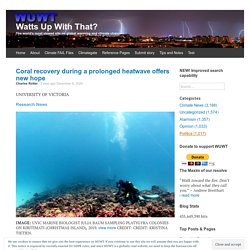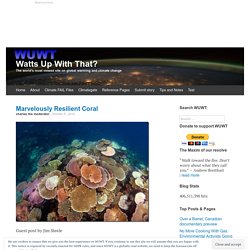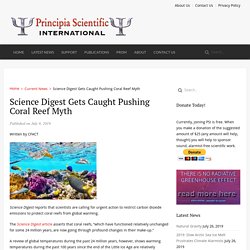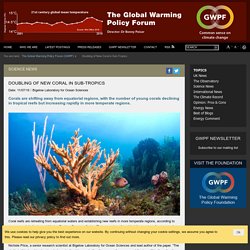

Coral recovery during a prolonged heatwave offers new hope. Research News.

Peter Ridd - Coral Reef Whistleblower - JCU. Sea Level - Coral Reefs. Ocean Acidification and Coral Reefs. The Great Barrier Reef--Australia. Coral Bleaching. Some corals do well in warmer waters – researchers ask how. From the National Oceanography Centre, Southampton (UK) This shows Acropora coral from the Persian/Arabian Gulf bleached during summer 2012.

Credit: Coral Reef Laboratory How do corals survive in the hottest reefs on the planet? Coral reefs are predicted to decline under the pressure of global warming. However, a number of coral species can survive at seawater temperatures even higher than predicted for the tropics during the next century. We tend to associate coral reefs with tropical seas of around 28 degrees, where even slight warming can have devastating effects on corals. In their study, the NOCS team worked closely with NYUAD researchers to select and characterise model corals from the Arabian/Persian Gulf, which will facilitate future molecular-scale investigations into why they can tolerate heat stress. CSIRO Scientists Accidentally Prove Coral Rapidly Adapts to Global Warming. Guest essay by Eric Worrall CSIRO Scientists have subjected coral symbiont algae to heat stress over four years, and produces a strain of algae which can help coral thrive in temperatures which normally cause coral bleaching.

They hope the new heat resistant algae can be useful for inoculating reefs suffering heat stress. Scientists successfully develop heat resistant coral to fight bleaching14 May 2020A team of scientists has successfully produced in a laboratory setting a coral that is more resistant to increased seawater temperatures.The team included researchers from CSIRO, Australia’s national science agency, the Australian Institute of Marine Science (AIMS) and the University of Melbourne.Corals with increased heat tolerance have the potential to reduce the impact of reef bleaching from marine heat waves, which are becoming more common under climate change.
NYUAD researchers find new method to allow corals to rapidly respond to climate change. Scandalously Bad Science – No Data on Coral Growth Rates for 15 Years. Reposed by request from Jennifer Marohasy’s Blog January 2, 2020 By jennifer CORALS are animals, closely related to jelly fish, but they differ in having a limestone skeleton.

This is hard-stuff, calcium carbonate, and it can persist in the environment and provide an indication of changes in sea level, and also the growth rates of corals, over thousands of years. My First Film: Beige Reef (Jennifer Marohasy) Reposted from Jennifer Marohasy’s Blog November 14, 2019 By jennifer FRENCH military general Napoleon Bonaparte is quoted as saying that, “A good sketch is better than a long speech.”

Then there is the expression, ”A picture is worth a thousand words.” So, why have I spent so much of the last two decades writing, rather than sketching or painting or better still making movies — given my often overwhelming desire to communicate something. I have sometimes placed ‘illustrations’ with my words, most usually time series charts that describe relationships by way of the number plane. According to Nature these corals do not exist. Marvelously Resilient Coral. Guest post by Jim Steele Published October 2, 2019 in California’s Battle Born Media newspapers – the Pacifica Tribune, the Novato Advance, the Sausalito Marin Scope, the Mill Valley Herald, the Twin Cities (Larkspur and Corte Madera) Times, the San Rafael News Pointer and the Ross Valley Herald.

What’s Natural? Imagine if today’s magnificent coral reefs all dried up and died – from the surface down to a depth of 400 feet. Horrifying! But that was exactly the case 20,000 years ago when growing glaciers of the Last Ice Age lowered sea level 400 feet. Coral Reefs Defy Climate Alarmists. By Paul Homewood More evidence that the Great Barrier Reef scare was fake: Scientists studying the southern edge of the Great Barrier Reef report remarkable recent growth in coral.

The findings defy alarmist predictions of doom and gloom after a cyclone damaged the reef and warming temperatures followed. Australian researchers conducted a four-year study off One Tree Island, which is one of the southernmost locations of the Great Barrier Reef. Scientists considered this portion of the reef in decline since the 1970s. Science Digest Gets Caught Pushing Coral Reef Myth. Published on July 9, 2019 Written by CFACT Science Digest reports that scientists are calling for urgent action to restrict carbon dioxide emissions to protect coral reefs from global warming.

The Science Digest article asserts that coral reefs, “which have functioned relatively unchanged for some 24 million years, are now going through profound changes in their make-up.” A review of global temperatures during the past 24 million years, however, shows warming temperatures during the past 100 years since the end of the Little Ice Age are relatively insignificant compared to temperature swings during the past 24 million years.
Doubling of New Coral in Sub-Tropics. Corals are shifting away from equatorial regions, with the number of young corals declining in tropical reefs but increasing rapidly in more temperate regions.

Coral reefs are retreating from equatorial waters and establishing new reefs in more temperate regions, according to new research in the journal Marine Ecology Progress Series. The researchers found that the number of young corals on tropical reefs has declined by 85 percent — and doubled on subtropical reefs — during the last four decades. “Climate change seems to be redistributing coral reefs, the same way it is shifting many other marine species,” said Nichole Price, a senior research scientist at Bigelow Laboratory for Ocean Sciences and lead author of the paper. “The clarity in this trend is stunning, but we don’t yet know whether the new reefs can support the incredible diversity of tropical systems.” Full Story. What’s really killing the Coral Reefs? From ScienceAlert!

There’s Another Thing Killing The Coral Reefs, And We Can Actually Fix This Problem Coral reefs are one of the most threatened ecosystems on our planet, and in the past two decades alone, half of the coral in Florida has died off completely. Global warming is known to be a deadly factor, but rising ocean temperatures are only part of the story. Thirty years of research in the Looe Key Sanctuary Preservation Area (LKSPA) on the southern tip of the Florida Keys has now revealed the cost of a devastating threat to coral that rivals even climate change: direct human pollution.
For years, agricultural run-off and improperly treated sewage have flowed into Florida’s ocean waters from the northern Everglades, elevating the sanctuary’s nitrogen levels and lowering the reef’s temperature threshold for bleaching, researchers say. Coral Mortality Rates Higher During Cold Periods – And There’s Been Recent Cooling In Coral Environments. In the coral habitats of the Western Indian Ocean, SSTs have cooled by -0.8°C since the 1980s (Watanabe et al., 2019).
It has long been established that exposure to extremely low temperatures induce coral bleaching and high mortality rates just as much as warm SSTs do. Further, colder periods – which are associated with falling sea level, habitat diminution, and increased exposure to UV radiation – have been documented to coincide with dramatic reef “switch-off” phases (Yan et al., 2019, Humblet et al., 2019). New Science Finds Coral Reefs Are Heating The Planet – Reef Ecosystems A Net Source Of CO2 Emissions. More Evidence for Rapid Coral Adaptation. By Jim Steele Good news continues to accumulate regards corals’ ability to rapidly adjust to changing climates. The view of coral resilience has been dominated by the narrative of a few scientists. In the 1990s they advocated devastating consequences for coral reefs due to global warming, arguing coral cannot adapt quickly enough. Since the Little Ice Age ended, they believed rising ocean temperatures had brought coral closer to a “bleaching threshold”, a more or less fixed upper temperature limit above which corals cannot survive.
Their model predicted the speed of recent global warming “spells catastrophe for tropical marine ecosystems everywhere”. World is going to hell but we’re finding new coral reefs everywhere… Click to enlarge map. 2016 was a good year for coral surprizes. Until recently no one even knew that corals could grow just out from the river-mouth of the Amazon. Then 9,300 square kilometers of reef was found living in a region no one thought corals could grow. Volunteers found very nice reefs in Morton Bay, not far from the ferry route, but entirely “unexpected” and “better than tourist sites”. Researchers also found another 4.000 square kilometers of reef off Queensland, hidden under 20m of water. In every media article the corals were immediately called into action against mining, farming, stuff like that. Somehow scientists that are wrong are always described as surprised, excited or astonished.
Oops… ‘scientists’ overlooked effect of ‘dead zones’ on coral reefs. Published on Written by Steve Milloy Key quotes: … they suspected it was caused by a dead zone–a low-oxygen area that snuffs out marine life–rather than by ocean warming or acidification…The team thinks that such dead zones may be common in the tropics but have gone largely unreported, simply because scientists never looked…Based on our analyses, we think dead zones may be underreported by an order of magnitude… The media release is below. Move On Over Mr Polar Bear, Corals are Now The New Poster Child of Global Warming Alarmism. The day has come. Scientists are heartbroken. NOAA National Ocean Service Education: Corals. Eco Alarmism? So Long, Farewell – Adieu! - Principia Scientific International. Inconvenient study: Higher temperatures could help protect coral reefs. A new study in the journal Behavioral Ecology, published by Oxford University Press, suggests that higher water temperature, which increases the aggressiveness of some fish, could lead to better protection of some coral.
Reefs of Norway - Lophelia.org, the Cold-water coral, deep-sea coral and deep-water coral resource. Coral Reefs, Temperature and Ocean pH. The Absolute Resilience of French Polynesian Reefs to Environmental Disturbances. Paper Reviewed Vercelloni, J., Kayal, M., Chancerelle, Y. and Planes, S. 2019. False Alarm: Spate Of New Studies Reject Claim Corals Are In Imminent Danger! By Dr. Sebastian Lüning and Prof. 4 New Papers Suggest Falling Sea Levels More Harmful To Corals Than Rapidly Rising Sea Levels. By Kenneth Richard on 16. March 2017. Coral Bleaching is Not a Tell-Tale Sign of Imminent Extinction. Paper Reviewed Guest, J.R., Low, J., Tun, K., Wilson, B., Ng, C., Raingeard, D., Ulstrup, K.E., Tanzil, J.T.I., Todd, P.A., Toh, T.C., McDougald, D., Chou, L.M. and Steinberg, P.D. 2016.
New studies take a second look at coral bleaching culprit. New Study Shows Some Corals Might Adapt to Climate Changes. The Resilience of Marine Ecosystems to Climatic Disturbances. The Future of Earth's Coral Reefs in Remote Regions of the World. Elevated Temperature Mitigates the Negative Impacts of Ocean Acidification on Porites Calcification. Another Example of Corals Being Capable of Biologically-Mediating their Calcification to Overcome Ocean Acidification. Massive Corals Can Adapt to End-of-Century CO2 Concentrations. Coral Calcification in the Face of Large Temperature Variations. Great Barrier Reef Corals Creating Their Own Calcifying Fluid pH. How Reef Invertebrate Diversity Responds to Coral Mortality. The Ability of Tropical Reef Fish to Acclimate to Global Warming. Acropora Coral Fossils Show Evidence of Immunity to Predicted Future Levels of Ocean Acidification and Warming.